EUROPARC Webinar, 3.11: Conflict management through participatory processes
We invite you to the next EUROPARC webinar “Conflict management through participatory processes: How Protected Areas can build partnerships with local stakeholders”.
- 3.11.
- 14:00 – 15:00 CET
- Free, but registration is mandatory
The webinar
Collaborations with local stakeholders are key objectives for Protected Area managers. Through dialogue, reciprocal listening and mutual understanding, conflicts can be mitigated.
In this webinar, we will hear from two experts on the creation and implementation of local platforms. These platforms, made up of local authorities, hunters, shepherds, farmers, scientists, and citizens, work on the coexistence between humans and large carnivores.
Furthermore, we will discuss with participants how some of these ‘lessons learned’ can be useful in other participatory processes and how they can possibly be adapted and replicated in the practices of different Parks.
This webinar will focus on participatory processes, and is aimed at Protected Areas managers working on dialoguing and building partnership with farmers and breeders, but also with tourism business and other local stakeholders.
Contributions and experiences from participants to be shared in the debate are welcomed!
The Programme
Welcome and Introduction
Stefania Petrosillo, Policy Officer at EUROPARC Federation
The regional platform projects on large carnivores: what works and what doesn’t
Valeria Salvatori, The Institute of Applied Ecology
Facilitating multi-level stakeholder platforms: the example of Sweden
Bernard Le Roux, Dialogues Facilitation Gothenburg AB
Q&A
Discussion with Participants
The Speakers
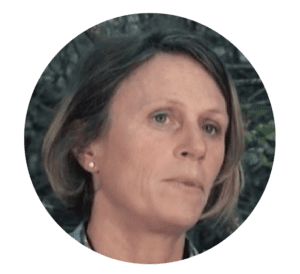
Valeria Salvatori
Valeria is councillor and secretary of The Institute of Applied Ecology (IT).
Wildlife research and management are her main interests. She is active in the area of large carnivore management, is a member of the IUCN LCIE-Large Carnivore Initiative for Europe, and has directed several LIFE projects targeting wolves and bears. She has interacted with hunters, foresters, livestock breeders, shepherds, farmers, scientists, and citizens in areas where wildlife species of particular interest such as large carnivores are present.
Since 2017 she manages the project “Establishment of local stakeholder platforms on large carnivores”, a EC funded project for the establishment of participatory processes on large carnivore management in high conflict areas in Europe. She is an active member of the EU Platform on Coexistence between People and Large Carnivores.
 Bernard Le Roux
Bernard Le Roux
Bernard is a facilitator, mediator, and co-founder of Dialogues Facilitation Gothenburg AB (SE).
He devotes his working time to developing and refining ways in which conflicts and tension can be transformed into growth and development for individuals, groups and society through dialogue. He believes in the power of honest and open dialogue to move beyond fixed positions as a way to avoid destructive conflict. Living in Sweden, he works with local and regional authorities, the Swedish Environmental Protection Agency, Forestry Service and Counties, the Peace Education Institute in Helsinki, and the Swedish Association of Municipalities and Regions. He also works with mediation policy and training in Colombia and teaches at the School of Collective Intelligence in Morocco. He is supporting the project “Establishment of local stakeholder platforms on large carnivores” and the EU Platform on Coexistence between People and Large Carnivores.
 Stefania Petrosillo
Stefania Petrosillo
Stefania is EUROPARC’s Policy Officer in Brussels.
In her role, she represents EUROPARC member’s interests towards the European Institutions. Stefania is an expert in advocacy and policy, and works in close cooperation with international NGOs and other EUROPARC partners. She has a long experience in international cooperation in EU and non-EU countries. In Brussels, she follows in particular the debates about the Common Agriculture Policy, and supports EUROPARC’s Commission on Agriculture and Protected Areas.

Puri Canals: Alfred Toeper Medal winner 2022!
Yearly, EUROPARC awards the Alfred Toepfer Medal to those who have made significant contributions to nature conservation.
The Medal
The Alfred Toepfer Medal is named after the “founding father” of EUROPARC: Dr h.c. Alfred Toepfer. Individuals, that have made a significant contribution to nature conservation through a lifelong body of work are recognised with the Medal. The medal is awarded by peers: it are the EUROPARC members that can nominate someone. The EUROPARC Council then internally votes on the winner.
Purificació Canals i Ventín
Transboundary Parks awarded 2020-2022
Due to a COVID-19 forced break, EUROPARC could not recognise the Transboundary Parks that joined the network in 2020. However, at the award Ceremonies during our Conferences in France and Austria in 2021 we could put the spotlight on the 10 Parks that (re)joined!
In EUROPARC we like to recognise the great work being done, managing our Protected Areas around Europe. After two years, we were finally able to award the Transboundary Parks that joined the network, or renewed their commitment.
Háldi Transboundary Area
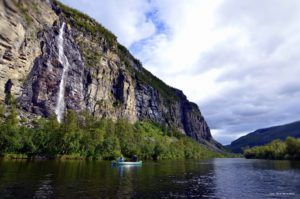
Reisa National Park- Ph. R. Benonisen
This area newly joined the TransParcNet”! It is a cooperation between the Finnish and Norwegian Park managers and unites the Käsivarsi Wilderness Area, Reisa National Park and Ráisduottarháldi Protected Landscape. Their verifier states:
Háldi Transboundary Cooperation Area is a contiguous wilderness area, managed in good cooperation to preserve high natural, cultural and recreational values of the most arctic area of continental Europe and in the heart of the Sami Homeland.
You can learn all about them here.
Internationaler Naturpark Bourtanger Moor – Bargerveen
Internationaler Naturpark Bourtanger Moor – Veenland is a unique bog ecosystem. The largest contiguous raised bog in Europe once reached from northwest Germany all the way into the Netherlands. After extensive destruction of the moor towards the end of the last millennium, the cross-border nature park has set itself the task of protecting and developing the remains of this fascinating habitat. But not only the moor areas with their magnificent bird life are waiting to be discovered. Likewise, picturesque river landscapes, purple blooming heather areas and old pastoral forests belong to the very special protected areas of the int. Naturpark Bourtanger Moor – Veenland.
Learn more about the Park here.
Scarpe-Escaut Plain European Nature Park
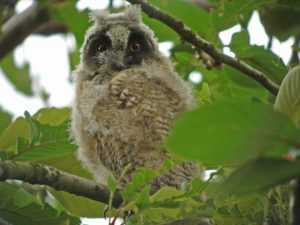
Owl at Scarpe Escaut, by Moyen Duc.
This Park, which shares a border with France and Belgium brings together the Scarpe-Escaut Regional Nature Park (PNRSE in France) and the Escaut Plains Nature Park (PNPE in Belgium). This territory has maintained a rural and natural character with many meadows, forests and wetlands, but is under pressure from the surrounding urban areas. At the intersection of major urban poles (Lille metropolis, Valencian, Douaisian and Tournaisian poles), its high population density, its industrial, mining, and natural heritage make it an atypical territory.
Learn more about the Park here.
Renewed commitment
Furthermore, the following areas renewed their commitment to this Transboundary network:
- Transboundary Area Julian Alps (IT/SI)
- Bavarian Forest & Šumava National Parks (DE/CZ)
- Krkonoše & Karkonosze National Parks (CZ/PL)
- Podyjí & Thayatal National Parks (CZ/AT)
- Neusiedler See – Seewinkel & Fertö-Hansag National Parks (AU/HU)
- Maas-Schwalm-Nette Nature Park (DE/NL)
- Saxon-Bohemian Switzerland Transboundary Areas (DE/CZ)
We congratulate all these Parks and thank them for their continued dedication to this EUROPARC Programme!
Meet the Alfred Toepfer Scholarship Winners 2022!
The winners of 2022. From left to right: Michael Hošek, Espen Quinto-Ashman, Caitlin Cunningham, Margaux Pierrel
Every year, the EUROPARC Federation, with the support of the Alfred Toepfer Stiftung, awards three scholarships to young professionals working in Protected Areas.
Meet the Alfred Toepfer Scholarship Winner 2022
The Alfred Toepfer Natural Heritage Scholarship grants 3000 euros to its winners. They can spend this money to travel to other Protected Areas and learn from their experience. Here, we introduce the 3 winners of 2022 and their travel plans:
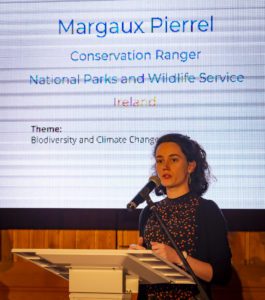
Margaux Pierrel
Margaux Pierrel – Studying Shifting Baseline Syndrome
Margaux works as a Conservation Ranger for the National Parks and Wildlife Service in Ireland. As part of her responsibilities, she monitors Natura 2000 sites, enforces the national and European wildlife and habitat legislation and engages with the community. Margaux has a strong interest in the concept of “shifting baseline syndrome” (SBS), also referred to as “environmental generational amnesia”. SBS is the situation in which over time, knowledge, or memory is lost about the state of the natural world, because people don’t perceive changes that are taking place. Her scholarship project is to study the effects SBS has on conservation measures in Protected Areas, particularly in terms of species loss, land use changes and rewilding. She aims at visiting places in the UK, the Netherlands, France, and Bulgaria that are aware of these challenges, in order to raise awareness and find solutions.
Caitlin Cunningham – How can we create nature-friendly green energy?
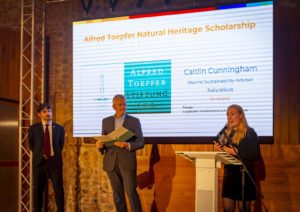
Caitlin Cunningham
Caitlin works wok as a Marine Sustainability Adviser for NatureScot. Her job involves coordinating environmental advice for offshore wind and marine renewable proposals in Scotland, considering impacts to our seas and marine life. In her role, she is directly involved in helping to tackle the climate emergency through the development of renewable energy, whilst also balancing the conservation of biodiversity through minimising environmental impacts. During her study visit to the Netherlands, Caitlin will learn from marine and coastal renewable energy developments that impact protected sites, as well as the mitigation in place to protect biodiversity. She aims to broaden her understanding of different approaches to sustainable development, and record any lessons learnt that can be applied across the marine renewable energy sector. Caitlin states: “I’m delighted to receive one of the Alfred Toepfer Scholarships and look forward to sharing my findings with the wider environmental community”.
Espen Quinto-Ashman – How are managing practices supporting ecosystems?
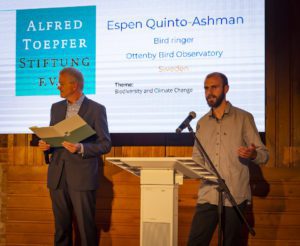
Espen Quinto-Ashman
Espen works as the Bird Ringer in charge at Ottenby Bird Observatory. Here, he leads a team of up to 20 volunteers in the daily standardised ringing activities and other biological inventories on the reserve. During his study visits, Espen aims to visit three Protected Areas: Bialowieza National Park and Biebrza National Park in Poland and Maramures National Park in Romania. These areas encompass an array of habitats which are comparable to those that can be found at Ottenby, albeit on a much larger scale. The habitats he is most interested in studying are: deciduous forest, marshes and meadow pastures. Espen will study how the management practices in the different parks are suited to the different ecosystems and how well they fulfil their job of protecting biodiversity as well as the key threats to nature in these places. There, he is particularly interested in how the presence of different species of large herbivores and carnivores, as well as the local hydrology, can affect the health of the habitats.
EUROPARC congratulates the three winners and looks forward to their reports! You can learn more about previous winners of the Scholarship here.
The Alfred Toepfer Scholarship is made possible through the generous support of the Alfred Toepfer Stiftung.
